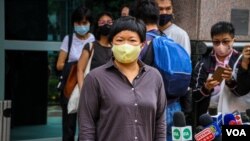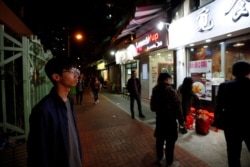The appearance in court Tuesday of journalist Bao Choy over her investigative reporting for Hong Kong’s public broadcaster is viewed as another blow to press freedom for the region.
The freelance producer for public broadcaster Radio Television Hong Kong (RTHK) faces two charges of making false statements to obtain public data.
The accusations are connected to a RTHK program she co-produced called “Hong Kong Connection,” which investigated the police response to an attack by suspected gang members in the town of Yuen Long on July 21, 2019.
Choy’s case is raising concern among Hong Kong’s local media about the state of press freedom within the semiautonomous city. While her charges were filed under Hong Kong’s local Basic Law, several high-profile figures have been detained since a National Security Law was imposed in June.
Tony Chung, former leader of activist group Studentlocalism, was arrested twice — once in July for inciting secession and a second time in October, when authorities charged him with secession, money laundering and conspiracy to publish seditious material, and ordered him to remain in custody.
In August, activist and media mogul Jimmy Lai was arrested for “colluding with foreign forces,” and Agnes Chow, a former member of the disbanded pro-democracy group Demosisto, also was arrested for “inciting secession.” Both were released on bail.
'Anything is possible'
Additionally, police have revised press accreditation guidelines that exclude some media; books deemed to violate the law were removed from public libraries; and a national security hotline for people to report breaches of the law has been set up.
“I never thought I would be arrested but it just happened, so anything is possible in this environment,” Choy told VOA outside Fanling Magistrates Court, after her hearing.
“[Authorities] are using the law to suppress press freedom, and that has already imposed a chilling effect on investigative journalism.”
Asked whether she felt her colleagues at RTHK also could be targeted, Choy said she believed it’s possible “under this atmosphere” since the new law was enacted.
The accusations against Choy relate to a broadcast in July — “7:21: Who Owns the Truth”—in which RTKH investigated an incident in which a mob dressed in white T-shirts and wielding sticks attacked pro-democracy protesters, journalists and bystanders. Hong Kong police were criticized for their slow response to the incident, which left at least 45 injured.
The attacks were a watershed moment during last year’s unrest, deepening demonstrators' anger toward the Hong Kong authorities and government and prompting months of tense protests.
For the show, Choy tracked down license plate registrations from cars seen on video transporting the suspected attackers. Choy’s case has been adjourned until January 14. If found guilty, she could face six months in prison.
Hong Kong police responded with “no comment” about Choy’s arrest when contacted by email from VOA.
Broadcasters 'frustrated'
Yvonne Tong, an executive member of RTHK Programme Staff Union, said her colleagues at the broadcaster were “frustrated” at Choy’s case because the accusations center on a common method used by investigative journalists.
“I can sense most of the colleagues, especially the producers and others in the same department as Bao, feel that they don’t know if they will be the next target,” she said.
One RTHK staff member, who asked to remain anonymous because of the sensitivity of the dispute, said that Choy’s case “highlights the ambiguity of RTHK.”
“We are both government body and public broadcaster," the staffer said. "When two things are in conflict, what should we do?”
It’s not the first time that RTHK has been in the spotlight with its conflicting interests as a government-funded agency.
It’s faced a series of issues with employees being investigated and warnings from Hong Kong's Communications Authority about "biased" programs. It has also axed programs that insulted authorities and removed interviews with high-profile activists.
Tighter control
Beijing implemented the National Security Law for Hong Kong after last year’s pro-democracy protests, which started over a proposed extradition bill and led to calls for further freedoms. The law prohibits secession, subversion, terrorism and collusion with foreign forces, with Article 65 of the law stating Beijing determines the final interpretation.
Because the law can be widely interpreted, any negative content or comment could be viewed as a violation of it. Critics, locally and worldwide, say it takes away press freedom.
In September, Hong Kong Chief Executive Carrie Lam said the law brought “stability” to Hong Kong. Earlier this month, Lam said, “Press freedom is guaranteed under Hong Kong’s Basic Law," and she added, “We will not suppress press freedoms.”
But another RTHK journalist, who also asked for anonymity, told VOA, “The duty of a reporter is to monitor government policies to see if they are in line with the public interests. If you cannot criticize the government under the National Security Law, it will be very difficult for us to do news.”
Wendy Xu, chair of the staff association at the Chinese-language daily newspaper MingPao, has insisted they don’t feel the need to censor since the law came into effect.
“We need to report the truth to the public,” Xu said. But Xu cited other problems for journalists at MingPao, including interviewees who refuse to comment on sensitive issues since the National Security Law came into force. After Choy’s arrest, Xu warned that journalists in Hong Kong would likely face future issues, too.
“Reporters now need to be more careful to avoid legal challenges as, sadly, we do not know where the red line is. I’m afraid that it is just the beginning and more journalists will be arrested,” Xu said.
Oath by civil servants
RTHK journalists also face changes in which they would be asked to pledge loyalty to Hong Kong. According to local reports, the chairman of the Federation of Civil Service Unions in Hong Kong has said the government plans to make all existing civil servants, including RTHK journalists, take an oath to upload the Basic Law and be loyal to the Hong Kong special administrative region. Newly recruited and promoted civil servants will have to take the new pledge soon.
One RTHK journalist told VOA there should be an “exemption” for RTHK.
“It’s very difficult for RTHK new staff because after they take the vow, swear the allegiance, but then they report something negative about the government as part of their job, they will be seen as going against their vow and they can be disqualified,” the journalist said. In October, the secretary for the Civil Service, Patrick Nip, told reporters those who breach the oath might be at risk of losing their jobs.
Others in Hong Kong have raised concerns about press accreditation changes under the Police General Orders, with police now recognizing only government-registered outlets and “internationally known” foreign media.
Bruce Lui, senior lecturer at Hong Kong’s Baptist University, said the police and authorities want to make it clear that if reporters are not working for “well-known media,” it’s at their own risk.
“I think this kind of pressure will make some reporters, especially from small organizations, hesitate from going out,” Lui said. “I asked some student reporters from other universities, and they said they now feel uncomfortable going out.”






